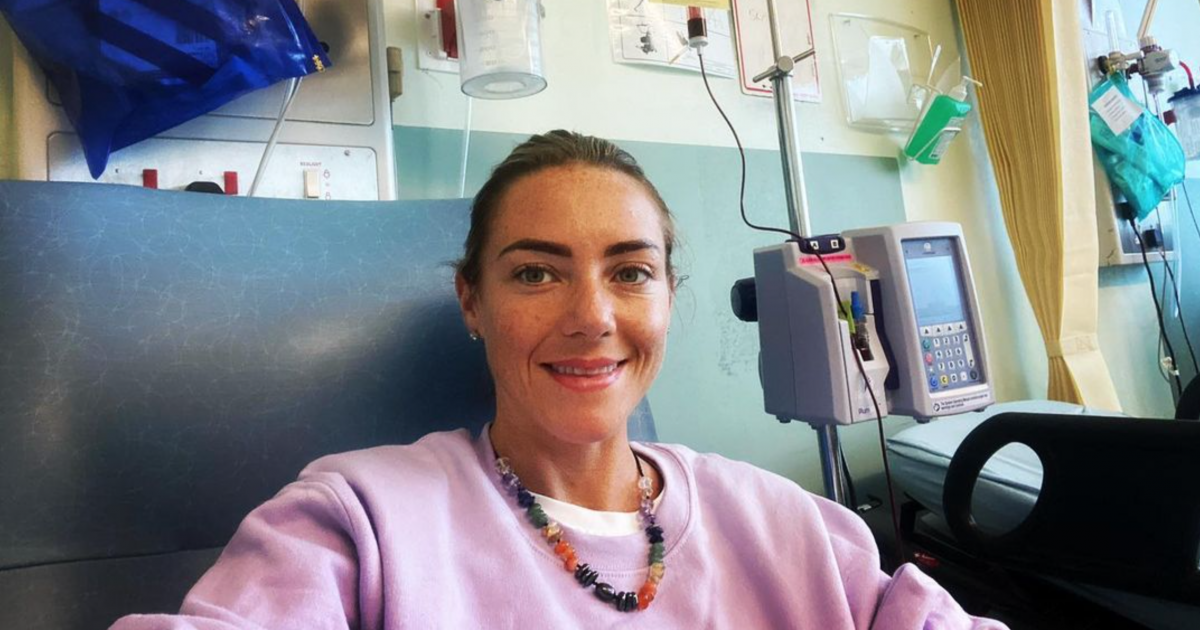Years of Pain
- For three years, doctors dismissed Laura Gilmore Anderson’s stomach pain and told her it would resolve itself.
- When they finally investigated further, Anderson was diagnosed with a neuroendocrine tumora rare form of cancer that can start anywhere in the body but started in Anderson's pancreas.
- Anderson underwent chemotherapy, but it was unsuccessful. She is now getting radiation and raising money to pay for further treatment.
Anderson was worried that her lower abdominal pain was caused by a condition that could be affecting her efforts to conceive with her husband. "I was always missing work and we were trying to conceive after we got married in 2018," she told The Mirror. "You're explaining that to the GP and I just thought there was something wrong with me, something related to ovaries or something like that. But they never investigated more early on."
Read MoreShe was diagnosed with a neuroendocrine tumora rare form of cancer that can start anywhere in the body but started in Anderson's pancreas. Anderson went through an intense chemotherapy treatment that ended up being ineffective. Now, she is receiving radiotherapy and working to raise money to cover the costs of her treatment.
How to Find Help After a Rare Cancer Diagnosis
Tens of thousands of people are diagnosed with rare types of cancer every year. People facing an uncommon diagnosis may find it difficult to find a doctor who specializes in their illness. SurvivorNet experts have specific guidance on ways that rare cancer patients can find helpful resources and take the initiative to get the help they need.
Here are some ways to find help:
Clinical Trials
Many SurvivorNet experts say that once they've exhausted all other options for treating their patients' cancer, or if they have a rare cancer, they'll recommend looking into clinical trials. How can you find active clinical trials that may be right for you? Check out clinicaltrials.gov.
Clinical trials may offer life-saving treatments for some people but they are also extremely important for scientific research.
This website is a database that the U.S. government maintains. It compiles privately and publicly funded clinical trials conducted around the world. It can be a particularly useful resource for cancer patients with rare conditions as a tool for finding doctors who are experts on their diseases.
Oftentimes, the most specialized doctors in a specific field end up leading clinical trials that push our understanding of diseases forward. If you know what the name of your disease is, you can search the disease name on clinicaltrials.gov and find the names of doctors leading these kinds of studies. This tool can help you identify the doctors who are best qualified to help you.
Academic Centers & Comprehensive Care Centers
For many cancer warriors, community oncology can be a great treatment resource. However, people with rare cancer might require specialized evaluation. Most of the time, the most effective place to find a specialist is at academic centers and comprehensive care centers.
A major benefit to seeking care at a comprehensive cancer center is that there will be a team approach to finding the best treatment.
"A comprehensive cancer center is a cancer center that has been essentially vetted by the National Cancer Institute, and provides outstanding clinical care in addition to basic and translational science and research," Dr. Ted Teknos, president at University Hospitals Seidman Cancer Center in Cleveland, Ohio, tells SurvivorNet.
Across the U.S., there are only about 50 accredited comprehensive cancer centers. There are also various cancer cancers.
What's the difference between the two, you might ask? Well, an NCI-designated cancer center means that a center has met NCI standards for cancer prevention, clinical services or research, but not all three. If a facility is an NCI-designated comprehensive cancer center, that means it meets NCI standards in all three categories.
Dr. Kenneth Miller, a clinical instructor at Mount Sinai, tells SurvivorNet about what differentiates a comprehensive cancer center from other treatment providers, like community medicine.
"Pretty much automatically, there's going to be a team approach (to your care)," Dr. Miller says. "Surgical oncology, medical oncology, radiation oncology and all the support services and also wonderful pathology and radiology." Dr. Miller explains that at a comprehensive cancer center, all of these different specialists work together to help you find the best treatment.
"We call it a tumor board a group to go through all the details of your case … so you get a group of very smart people coming up with a plan together that is hopefully optimal and gives you the best chance of doing well."
Learn more about SurvivorNet's rigorous medical review process.


